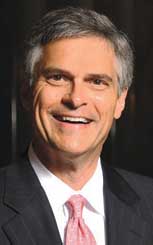All the tears, the weeping, the searching for an understanding of what it meant — this is what I saw and remember.
Three years before Dallas, Senator John Kennedy came to Lexington on October 8, 1960 for a rally on the big yard in front of U.K. Our Dad got us up before sunlight, my brother Keen and me, to get to campus at the step-side corner of the stage.
Almost no one was there. Hundreds arrived, finally several thousand, boisterous and excited, especially the loud group of students chanting “We want Nixon” near us. The place was roaring when Kennedy hopped onstage, where various leaders were waiting. Our grandfather, Keen Johnson, was among them.
As the event ended Kennedy worked the front line right where we were, so our Dad pushed us up to reach out to the candidate as he left.
We managed to get in the long motorcade to the airport. It was near there that I saw the extraordinary Wilson W. Wyatt of Louisville cheering Kennedy. Wyatt shouted “Huh-rah for Kennedy” — not hooray, but a classy, uniquely toned encouragement.
Funny what one remembers.
Then 50 years ago, when Mr. Briscoe Evans came over the intercom at Morton Junior High it was to say that “President Kennedy has been shot. I repeat: President Kennedy has been shot.” I was in study hall, last period, a Friday. Miss Conner, the dear, elderly teacher serving as proctor, was visibly upset.
 Within the hour Evans’ came back on to say the President was dead. Miss Conner buried her face in her hands and wept. She was shaking. We sat in shock, awkward middle schoolers unable to adequately take it in.
Within the hour Evans’ came back on to say the President was dead. Miss Conner buried her face in her hands and wept. She was shaking. We sat in shock, awkward middle schoolers unable to adequately take it in.
My concern grew as school was dismissed for the weekend and teachers were in the hallway, openly crying, even panicked it seemed. I had never seen anything like this.
Kids on my street walked home many days. As we came down the block my friend’s mother stood in their driveway, sobbing. They were Catholic. She cried over and over in the days ahead.
When we reached our house our mother was standing in the doorway too upset to speak.
On the day of the funeral there was the muffled drumbeat, the rider-less horse, the tear-stained face of the former First Lady through her thin black veil, the salute of a little boy to his father.
America watched all of this.
In time Dr. King would be murdered. We were in high school by then. That summer during Boys State at Eastern Kentucky University Robert Kennedy was shot. Then-Speaker of the House Harry King Loman of Ashland, the moderator, told us when RFK was gone.
Mitchell Nance of Glasgow was elected governor of Boys State. All of us thought about public service that week, the price some paid. I recall thinking what a decent guy Nance was. He went on in life to serve on the bench in Barren County.
Months passed. Nixon would rise. Then fall. Years would go by. Reagan would be shot in the first hundred days of his presidency. It happened the week I filed to run for Lexington city council, bringing back the continuum of losses. It all seemed to connect as if the word transition were not a post-election acion, but a way of life never quite understood in advance.
The glorification of Kennedy went on for weeks; clearly this continues. There is much to show for his inspiration, much promise in his step, many poignant moments.
America watched Kennedy. After he refused to wear a top hat to his swearing-in on a truly frigid day, my brother and I told Mom we would never again wear the hats she insisted we have. This pledge became a family laugh line.
Back then, people watched politics in different way. Many were glued to political party nominating convention coverage, or State of the Union addresses, or even presidential appearances from the Oval Office. They spoke of such things matter-of-factly, having paid attention.
You could say that not much else was competing on TV. But there is more to it.
Many, like my brother and me, were “children of the war” — born of parents brought together in the after years of World War II. Parents of this generation paid attention, listened differently than today. Most had heard Roosevelt. All had heard Truman or Ike, their general. It was a duty to listen.
The violent moment of Kennedy’s death left many to lament the death of an era. Some others, though, re-doubled their efforts to see public ideas, moving into action.
In many American moments there has been the deep question of what it will take to unite us. The shock of murder, especially in a schoolhouse, is one. Disaster and tragedy call on us to do something, do what we can, stretch to help.
Given the current moment, however, what losses must we suffer, realize or remember?
Just as failure can often teach more than success, tears may teach us what matters most of all. So might many recollections help us take hold of this piece of time, grow better together, closer to our purpose.
Ask more, just as Kennedy said.
Once when bucking establishment opinion and direction, Kennedy famously scoffed: sometimes the party asks too much. Indeed so.
What today is asking very likely has less to do with party matters, but more to do with what really matters. A simple prayer would ask that we listen, hear the answer.
Bob Babbage is a leading lobbyist who heads Babbage Cofounder. He served Kentucky as secretary of state and state auditor, and often appears in the media for moderate context and perspective. Reach him at Bob@BabbageCofounder.com.









Leave a Reply